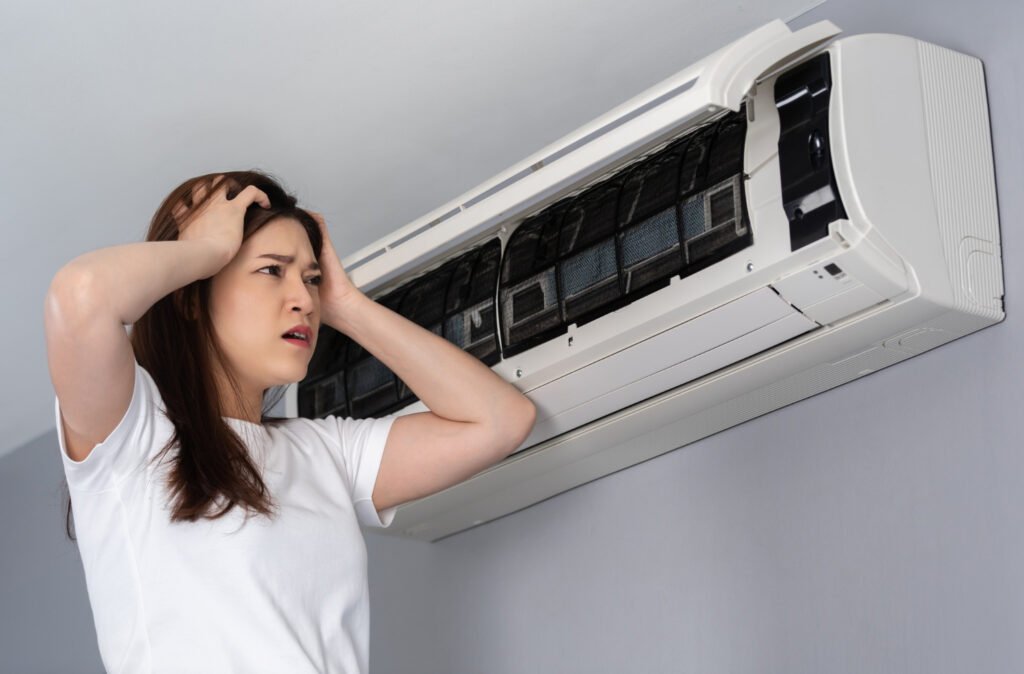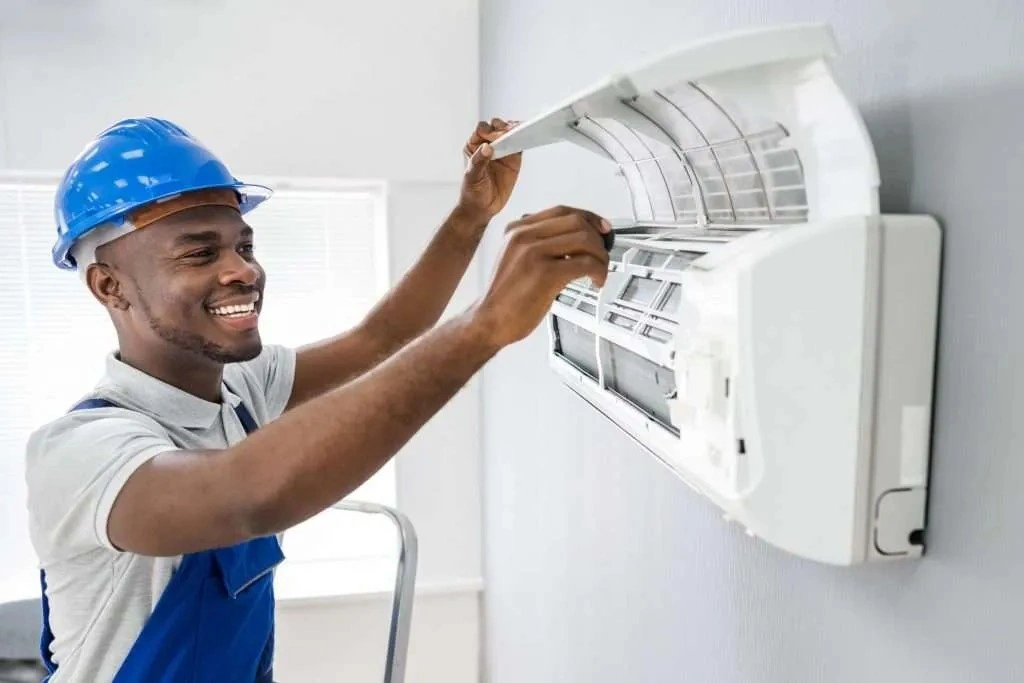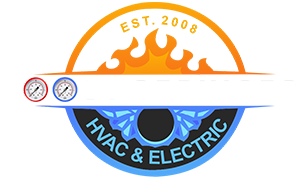When the summer heat in Pasadena hits its peak, a functioning air conditioner is not just a luxury—it’s a necessity. Yet, many homeowners find themselves in a bind when their AC unit starts acting up. Understanding the early signs that your AC needs professional help can save you from discomfort and costly repairs. Let’s explore the tell-tale signs indicating your AC unit may be in need of expert attention.

Table of Contents
1. AC Running but Not Blowing Cold Air: Common Causes and Solutions
One of the most common complaints during a hot summer day is an air conditioner that runs but fails to blow cold air. If your AC unit is running but the air isn’t cold, it’s a clear indication that something is amiss. This could be due to a variety of issues, such as a refrigerant leak, a malfunctioning compressor, or blocked vents. Rather than attempting to fix this yourself, it’s crucial to seek professional assistance to diagnose and rectify the problem efficiently.
Causes and Solutions
- Refrigerant Leak: A loss of refrigerant can significantly impact your AC’s ability to cool. Professionals can identify and fix leaks, ensuring optimal cooling performance.
- Compressor Issues: The compressor is the heart of your AC system. If it’s not functioning properly, it can prevent your unit from cooling effectively.
- Blocked Vents: Ensure that your vents are free from obstructions. However, if the issue persists, a professional evaluation is necessary.
2. AC Not Cooling House Despite Running
If your AC unit is running continuously but your home remains uncomfortably warm, this is a sign that warrants professional intervention. This situation can lead to increased energy bills and decreased comfort levels.
Potential Problems
- Thermostat Malfunction: A faulty thermostat can cause your AC to run inefficiently. Professionals can recalibrate or replace it as needed.
- Ductwork Problems: Leaks or blockages in your ductwork can lead to uneven cooling. An HVAC technician can inspect and repair your ducts to improve efficiency.
3. Strange Noises Coming from Your AC Unit
Unusual sounds such as grinding, squealing, or banging are red flags that something is wrong with your air conditioner. These noises can indicate a variety of issues, from loose parts to motor problems.
What to Listen For
- Grinding or Squealing: These noises often indicate issues with the motor or bearings. Prompt attention can prevent further damage.
- Banging or Clanking: These sounds may suggest that a part is loose or broken. Immediate professional assistance is recommended to avoid exacerbating the problem.
4. High Humidity Levels Inside Your Home

Your air conditioner should not only cool your home but also manage humidity levels. If you notice that your home feels more humid than usual, it might be time to call in a professional.
Why It Happens
- Oversized AC Unit: An AC unit that is too large for your space can cool the air too quickly without adequately dehumidifying it. A professional can help determine the appropriate unit size for your home.
- Lack of Maintenance: Regular maintenance is key to ensuring your AC operates efficiently, including its ability to control humidity.
5. Unpleasant Odors Emanating from Your AC
Foul odors coming from your air conditioning unit are more than just a nuisance—they can indicate serious issues within your system.
Common Causes
- Mold or Mildew: A musty smell often indicates mold or mildew growth within your AC or ductwork. This not only affects air quality but can also pose health risks.
- Burning Smell: A burning odor may suggest electrical issues or overheating components. This requires immediate professional attention to prevent potential fire hazards.
Why Professional Help is Essential
Attempting to fix AC issues on your own can lead to further damage and void warranties. HVAC professionals possess the expertise and tools to diagnose and resolve problems effectively, ensuring your unit operates efficiently and safely.
Benefits of Hiring a Professional
- Accurate Diagnosis: Professionals can quickly identify the root cause of AC issues and provide targeted solutions.
- Safety First: Handling refrigerants and electrical components can be dangerous. Certified technicians ensure repairs are conducted safely.
- Long-Term Savings: Timely professional intervention can prevent minor issues from becoming major, costly repairs.
Conclusion
Recognizing the signs that your air conditioner needs professional help can spare you from the discomfort of a malfunctioning unit and the expense of major repairs. By paying attention to these signs and seeking professional assistance, you can ensure your AC unit keeps your Pasadena home cool and comfortable all summer long. Remember, regular maintenance and prompt attention to issues are key to prolonging the life of your air conditioning system.

Call to Action
If you’re experiencing any of these issues with your AC unit, don’t hesitate to contact a trusted HVAC professional in Pasadena. Ensure comfort and efficiency in your home by addressing problems early with expert help.
FAQ — AC Needs Professional Help
What are the most common signs my AC needs professional help?
Call a technician if you notice warm air from vents, weak airflow, strange noises or smells, frequent cycling on and off, water leaks, ice on the refrigerant lines, or unexplained spikes in energy bills.
Why is my AC blowing warm or barely cool air?
Warm air can indicate low refrigerant, a failing compressor, a clogged filter, a dirty coil, or a malfunctioning thermostat. A pro can test refrigerant levels, inspect components, and restore proper cooling.
What does weak airflow usually mean?
Poor airflow often points to a clogged filter, blocked or leaky ducts, a failing blower motor, or a dirty evaporator coil. Ignoring airflow issues can cause frozen coils and compressor strain.
Which AC noises signal an urgent problem?
Unusual sounds suggest mechanical or electrical trouble:
- Grinding or scraping may indicate motor or bearing failure
- Banging or clanking can mean loose or broken parts
- Screeching often points to belt or motor issues
- Bubbling or hissing can indicate refrigerant problems
- Loud buzzing may signal electrical faults or a failing contactor
What smells from the AC require a technician?
Burning, chemical, or fishy odors can signal electrical issues, overheating components, or refrigerant leaks. Musty smells often point to biological growth in the drain pan or ducts and require professional cleaning and treatment.
Why does my AC frequently turn on and off?
Short cycling can result from incorrect system sizing, low refrigerant, dirty coils, restricted airflow, or faulty sensors. It wastes energy and accelerates wear on critical parts.
Is ice on the refrigerant lines or outdoor unit normal?
No. Ice buildup usually means low refrigerant, dirty coils, restricted airflow, or a failing blower. Continuing to run the system can damage the compressor and should be avoided until a technician inspects it.
What causes water leaks around my indoor unit?
Leaks often come from a clogged condensate drain, a cracked drain pan, or excessive evaporator coil icing. A technician will clear the line, fix the pan, and address the root cause to prevent water damage.
Why did my breaker trip and the AC will not start?
Repeated breaker trips can indicate electrical faults, a seized compressor, or a failing motor or capacitor. Do not keep resetting the breaker. Have a professional diagnose and correct the issue safely.
What if my energy bills suddenly spike without better cooling?
Sharp increases in energy use often signal a failing compressor, dirty coils, duct leaks, low refrigerant, or a thermostat problem. Professional testing can pinpoint inefficiencies and restore performance.
When should I call for emergency AC service?
Seek urgent help if you smell burning, hear loud banging or screeching, see smoke, experience continuous breaker trips, or if vulnerable occupants face dangerous indoor temperatures during extreme heat.
Can routine maintenance prevent these problems?
Yes. Annual professional tune-ups and regular filter changes help catch refrigerant leaks, electrical wear, drainage issues, and coil grime early, reducing breakdowns and extending system life.
Do thermostat issues require a professional?
Not always. Try replacing batteries, checking schedules, and ensuring correct modes and setpoints. If the system still short cycles, fails to start, or cannot hold temperature, a technician should evaluate controls and sensors.
When is repair no longer cost effective?
Consider replacement if the unit is 10 to 15 years old, uses outdated refrigerant, needs frequent major repairs, or has poor efficiency compared to modern systems. A pro can provide cost and payback comparisons.


Orionplay is chill. Selection of games is alright – something for everyone I reckon. Good if you’re just looking to unwind: orionplay
Hey, I tried to enter genzobetgiris and the page does not charge properly, did it happen to someone else? Let me know here genzobetgiris
scatter https://www.ascatter.com